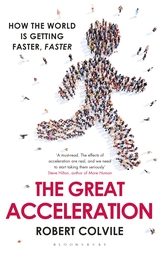I have read with interest recent reviews of Robert Colville’s new book The Great Acceleration: How the World is Getting Faster, Faster, which is released today. The book looks at how technology and our insatiable desire for convenience have speeded up every part of our lives. Our walking speeds have increased 10% since the 1990s, and the time it takes to load this page using ‘predictive search’ is estimated by google to cut 2-5 seconds per search, or 350 million hours each year.
have read with interest recent reviews of Robert Colville’s new book The Great Acceleration: How the World is Getting Faster, Faster, which is released today. The book looks at how technology and our insatiable desire for convenience have speeded up every part of our lives. Our walking speeds have increased 10% since the 1990s, and the time it takes to load this page using ‘predictive search’ is estimated by google to cut 2-5 seconds per search, or 350 million hours each year.
Although Colville seems broadly optimistic about our faster paced life and argues that this acceleration is associated with contentment and prosperity, he does look at some of the negative effects of speeding up. For example, he cites workplace research which suggests that 94 per cent of workers sometimes feel “overwhelmed by information to the point of incapacitation”.
This made me think about the effect of acceleration, how this relates to workplace conflict, and how this faster pace of life might be affecting employees in and out of work in an adverse way. When I reflect on the many workplace mediations I have facilitated, I can cite numerous examples where our busier, faster lives have played a contributing role: the email that was sent in haste, that regularly cancelled one-to-one meeting, and the tweet that shouldn’t have been published.
When I chat with other experienced workplace mediators who have been mediating for a long time, we often remark that the mediations of 2016 seem more complex than the ones we did 10 years ago. Although this is just anecdotal, might this be in part due to the pace of change and associated faster pace of life?
The new workplace is an exciting place to be, with so much innovation and potential. However, it reminds me that workplace mediation provides something very different: a space and time away from technology where parties in conflict are forced to slow down, think, talk face-to-face and explore a better way forward.
Hopefully some of us will find time in our busy lives to read what appears to be a very interesting and thought-provoking book.


